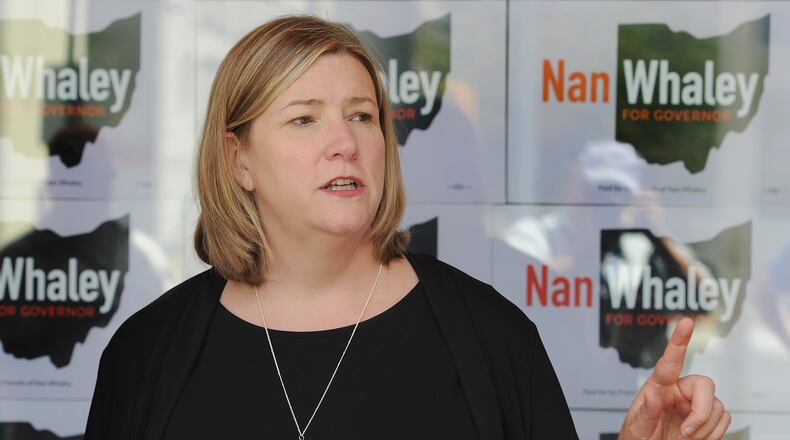The tour will visit all counties between now and the May 3 primary election in 2022. The general election is Nov. 8 next year.
After the announcement, Whaley headed to Troy, a Miami County Republican stronghold, where she was to hold a meet-and-greet with activists and allies.
“That’s not a place Democrats typically travel to, even though it’s close to here in Dayton — it’s a pretty Republican area,” said Whaley, who has been Dayton’s mayor since 2014. “But this campaign is about every single Ohioan.”
Asked about concerns she hears from voters, Whaley referenced what she called “self-dealing” in Columbus.
“The level of corruption … we have people tell us that they’re paying for this every month on their electric bill,” a reference to the FirstEnergy Corp. bribery scandal.
“Just so we’re clear: FirstEnergy bribed a bunch of Republicans, and they charged electric customers for those bribes,” Whaley tweeted Tuesday.
Documents released recently show that FirstEnergy paid attorney Sam Randazzo tens of millions for years, including $4.3 million shortly before Ohio Gov. Mike DeWine nominated Randazzo as head of the Public Utilities Commission of Ohio. Randazzo has not been charged with a crime and has denied wrongdoing.
Dan Tierney, a DeWine spokesman, said Thursday that even though the federal probe into the FirstEnergy matter is “mature,” at no time has “the Department of Justice, the FBI, contacted the governor’s or lieutenant governor’s office for questioning. At no time have they issued any subpoenas. At no time, have they identified anybody as a person of interest.”
Whaley raised $1.64 million through June 30, a number higher than what Democratic candidates drew to the governor’s race at a similar point four years ago. The campaign has about $1.35 million cash on hand.
Her Democratic opponent, Cincinnati Mayor John Cranley, raised about $1.07 million in the first half of 2021. His campaign had $1.3 million.
DeWine, a Republican, raised $3.08 million in his re-election campaign in the six months ending June 30, more than Whaley and Cranley’s campaigns combined.
DeWine’s campaign said 96% of contributions came from Ohioans.
Whaley launched her campaign in April. In May 2017, she entered the Democratic primary for governor but dropped out early in 2018 and backed Richard Cordray, who lost to DeWine.
About the Author

